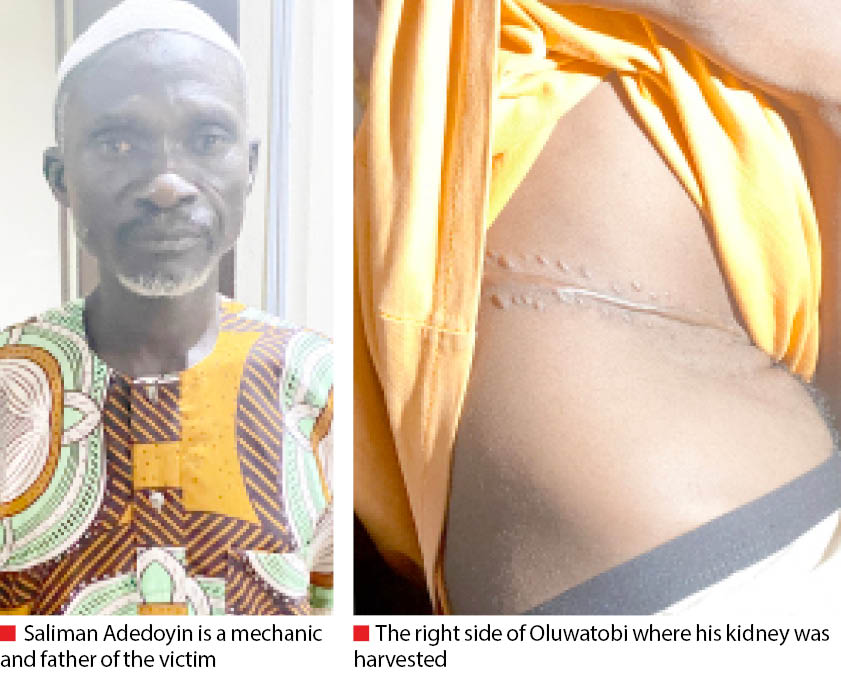Organ harvesting: Oluwatobi must get justice
It was with great shock that Nigerians, through a recent investigative story by this newspaper, realised that what was generally believed to be a foreign phenomenon had since arrived in the country and was becoming widespread. It was the story of how Oluwatobi, the 16-year-old eldest son of Saliman Adedoyin, was lured into having his […]

It was with great shock that Nigerians, through a recent investigative story by this newspaper, realised that what was generally believed to be a foreign phenomenon had since arrived in the country and was becoming widespread. It was the story of how Oluwatobi, the 16-year-old eldest son of Saliman Adedoyin, was lured into having his kidney harvested at a medical facility in Abuja in February this year. Oluwatobi lives with his father in Masaka, a suburb of the FCT located in Karu LGA of Nasarawa State.
The energetic Oluwatobi disappeared on the day he was scheduled for his biometric capture at a Unified Tertiary Matriculation Examination (UTME) centre and was not seen or heard from by his parents until a month later when a family friend called his father to inform him that his son had arrived in Lagos. When his Lagos guardian noticed a long fresh scar beneath his right rib cage, he questioned Oluwatobi, who confessed that he was forced to flee home following threats by a syndicate of organ harvesters, who, after taking his right kidney, were ready to go to any length to silence him. Globally, organ harvesting syndicates target vulnerable individuals from poor backgrounds such as Oluwatobi.
To lure Oluwatobi, his friend whom he referred to as Yellow, informed him of a job that would earn him some money. He was thereafter coerced by a member of a syndicate who posed as a nephew to one Egbuson Sampson, a patient with failed kidneys at the Abuja-based Alliance Hospital in Area 11, Garki. Oluwatobi was cajoled into meeting one Emmanuel Melody, who said he was a staff of Alliance Hospital in Abuja. Oluwatobi was then persuaded to submit himself for a blood test, which Mr Melody said was needed for the job. Three days later, Melody reached out to Oluwatobi through Yellow and requested another meeting where they told him that they wanted his kidney. Oluwatobi declined the offer and left.
A few days later, the syndicate again reached out to Oluwatobi to come for part payment and that he could go back home and think over it. He was then handed over to a staff of the hospital, Chikodili Ugochukwu, who took him to court to swear to an affidavit. In circumstances that looked as if everything was stage-managed, Oluwatobi was told that it was too late for him to go home and was thus advised to sleep in the hospital’s ward. “They woke me up in the night to sign some documents,” Oluwatobi said. From there, the hospital staff went on to harvest the organ.
Civic tech organisations to train journalists in healthcare reporting
Gombe gov orders closure of night clubs
It is indeed unfortunate that this boy had to go through all that he experienced and we urge that government and civil society organisations take up this matter and see it to a logical conclusion. Though the hospital has explained its role in this incident, there is a need for further probe into the activities of the centre and its staff members, especially as they concern this case. All the culprits must be arrested and made to face the full wrath of the law. We also call for compensation for the victim.
The kidney is the world’s most trafficked human organ. Section 48(2) of the National Health Act 2014 states that a person shall not remove tissue, which is not replaceable by natural processes, from a person younger than 18 years. Section 20(3) of Nigeria’s Trafficking in Persons (Prohibition) Enforcement and Administrative Act 2015 also criminalises enlisting, transporting, delivering and accommodating a person under the age of 18 for the purpose of removing the person’s organs.
Given how easy it was to falsify Oluwatobi’s age in addition to other false information provided in the court affidavit, we call on authorities of the Nigerian judiciary to review the processes for acquiring a court affidavit and ensure that all loopholes are tightened so that it cannot be manipulated for the wrong purposes.
It is a national embarrassment that Oluwatobi’s case, as pathetic as it is, has not been raised as a matter of urgent national importance on the floor of the National Assembly. It’s also sad that neither the Federal Ministry of Health nor NAPTIP has made any categorical statement since the matter became public knowledge.
While we call for a thorough investigation into Oluwatobi’s case, Daily Trust urges the federal government through the Ministry of Health to come up with a method through which organ harvesting can be regulated and ensure that transplant centres operate based on best ethical practices. We also advise citizens to be wary of such offers. All offers must be properly scrutinised before consent is given. This is an issue that is here with us in this country. We cannot deny it any longer and all effort must be made to nip it in the bud.
